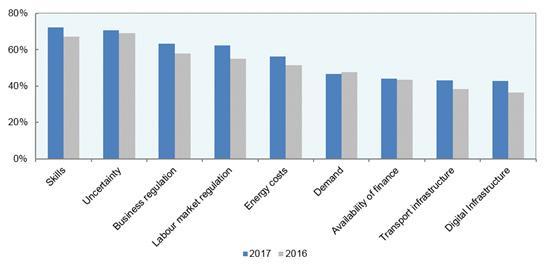The EIB’s Investment Survey indicates that ‘lack of skills’ became the most frequently named obstacle to investment for European firms last year. What can we do?
By Patricia Wruuck, economist at the EIB
Limited availability of people with the right skills impedes the investment activity of more than 70% of European firms, according to the survey. Finding and keeping qualified staff is among the top three investment impediments in most member states, but perceived skill shortages seem particularly prevalent in Central and Eastern Europe, where more than 80 % of firms find the limited availability of staff with the right skills to be a problem.
Impediments to investment in comparison (EU average)
The survey asked firms: Thinking about your investment activity in [your country], to what extent is lack of staff with the right skills a major obstacle, minor obstacle or not an obstacle? The graph shows how many companies chose ‘major’ or ‘minor’.

What is behind the reported skill shortage? Both cyclical and structural factors are reflected in firms’ responses. With the recovery gaining momentum in a number of member states at the time of the poll, firms are increasingly looking for people, and finding the ones that fit is not always easy.
- Technological change is having an impact on many industries and jobs. Tasks change and firms are looking for personnel with different skills or skill combinations than the ones they wanted ten years ago. Digital skills like Big Data analytics is but one example.
- In Central and Eastern Europe, demographics and emigration also add to difficulties in finding personnel.
Consequently, the reported skills shortage is reflected in firms’ “wishlist” for policymakers. When asked about which areas they would like to prioritize for public investment, looking ahead to the next three years, about a quarter states that investment in professional training and higher education should be a priority.
What could be done to address skill gaps in Europe?
We took a closer look, bringing together analyses from several experts, and five insights emerged:
-
Economic integration, for instance through the rise of global value chains and mobility of labor, makes cooperation on education and training more important and requires coordinated policy responses.
- Focusing on education and training policies in isolation is unlikely to be enough. Rather, strategies to promote skills successfully should be embedded in a comprehensive ‘whole of government approach’, including, for instance, labour market, competition and migration policies. For example, education and training policies as a standalone may not succeed in boosting innovation if migration policies prevent countries from building links and strong innovation networks with others.
- “Upskilling”, or increasing the level of skills of the population, is not enough. The conditions for creating jobs to make use of these skills also need to be right. Notably this includes addressing barriers to firm entry and exit, growth and innovation and allowing resources to reallocate.
- Technological change creates significant challenges for education and training systems in Europe. In particular, automation brings adult education to the forefront of policies and measures to help people prepare for job transformation and adapt to changing skill needs.
- Quality vocational education and training programs are key to employability. Increasing permeability of the programs, for instance through dual study programs and options for continued vocational education and training, is crucial.
Why investing in skills is worthwhile for Europe
Investment in skills and education promises a double dividend. First, it is a way to make societies more equitable, giving more members a fair chance. Second, it can improve efficiency, helping people and economies to make best use of talent. Altogether, skills underpin the EU’s capacity to innovate and to adopt innovation successfully.
Ideas are increasingly going to power economic growth in Europe. Investment in education and skills provides the basis to generate them—and to successfully benefit from them.
You can download the entire study here: Investing in Europe’s future: the role of education and skills